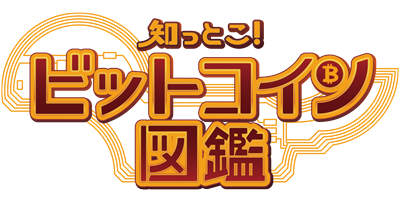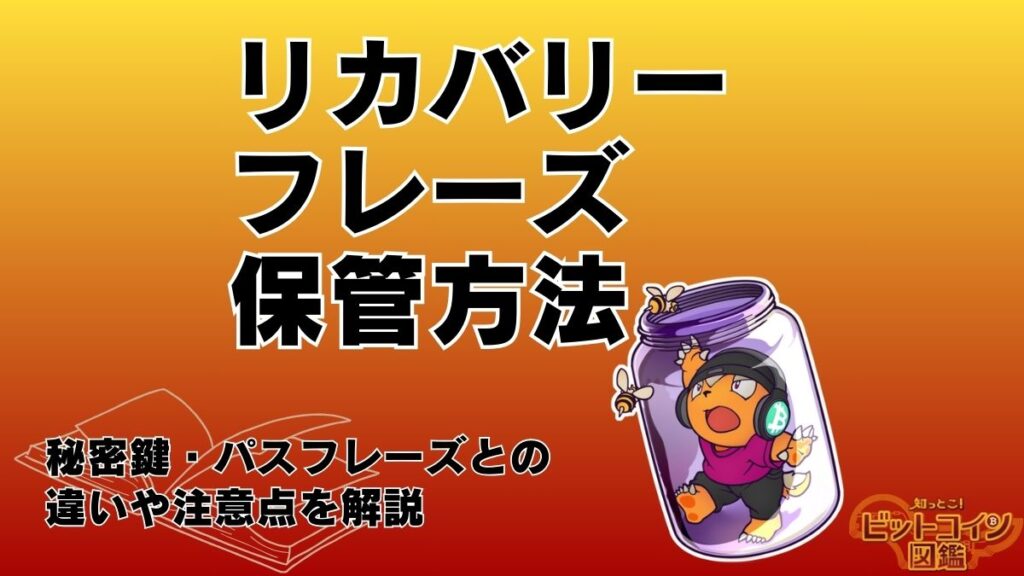

What is a recovery phrase? I’ve heard storing it can be tricky…
When self-custodying Bitcoin, it's essential to protect words like recovery phrases and passphrases carefully.
In this article, I’ll explain terms related to recovery phrases and how to store them securely.

Summary
- A recovery phrase consists of 12 or 24 randomly generated words. A passphrase is an additional word that can be added to protect your recovery phrase or wallet.
- Record the recovery phrase on paper or a metal plate and store it with precautions against fire and water damage. Distributed storage and memorization are also effective.
- There is no perfect solution for Bitcoin self-custody. The optimal method varies depending on the amount of BTC, the situation, and individual preferences.
This article was written in Japanese and converted to English using a translation tool.
Date of writing (Japanese version): June 2024
Terms Related to Bitcoin Storage
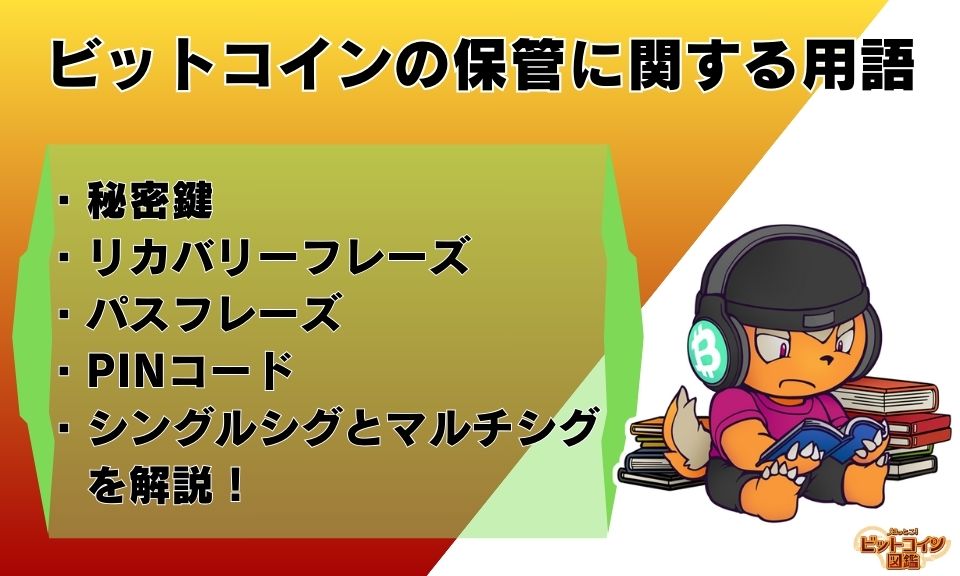

The terms related to Bitcoin storage are confusing. I can't really tell the differences…
It's good to remember the differences between recovery phrases, private keys, passphrases, and PIN codes.

Recovery Phrase / Mnemonic Phrase / Seed Phrase
A recovery phrase is a list of 12 or 24 randomly generated words. If your wallet is damaged or lost, you can use the recovery phrase to access your Bitcoin address. Depending on the wallet, it might be called a recovery phrase, mnemonic phrase, or seed phrase.
With the introduction of the BIP-39 standard, Bitcoin addresses can be managed using easily memorable English words.

Private Key
A private key is information used to sign transactions and prove ownership of Bitcoin. It is made up of a string of random 0s and 1s, forming a long alphanumeric string.
A seed is generated from the recovery phrase, which is used to manage the entire wallet. This seed can then create many private keys.

Passphrase
A passphrase is an additional string of characters that a user can add to protect their wallet or recovery phrase. Even if the recovery phrase is compromised, the passphrase can reduce the risk of your Bitcoin being stolen.
Even if you use the same recovery phrase, the presence or absence of a passphrase will result in separate wallets. You can use a wallet without a passphrase for daily transactions and small amounts of funds, and a wallet with a passphrase for larger amounts or long-term storage.
About Passphrases
- At least 12 characters are recommended.
- Combine uppercase, lowercase letters, numbers, and symbols.
- Avoid personal information and simple words.
- Do not use words that are only in the dictionary.

A passphrase can be any string you decide on, and it’s recommended to combine uppercase and lowercase letters, numbers, and symbols.
If your recovery phrase is compromised, you should immediately create a new wallet. Think of a passphrase as buying time before your assets are stolen, not as a guarantee of safety.

PIN Code
A PIN code is a short numerical code required to access the wallet device. It is different from the recovery phrase or private key security.
Like a smartphone unlock code, some devices won't allow access if the PIN code is forgotten.
If you forget the PIN code for the Bitcoin-focused wallet COLDCARD, you won't be able to access your Bitcoin.
Be aware that some people accustomed to other hardware wallets like Ledger or Trezor might think they can reset the PIN and recover using the seed phrase, but that's not the case here.


You need to manage recovery phrases, passphrases, and PIN codes very carefully!
Single-Sig and Multi-Sig
Single-sig uses a single private key, while multi-sig uses multiple private keys to approve Bitcoin transactions.
- Single-Sig
…A state where the entire wallet is managed with a single private key without setting a passphrase. - Single-Sig + Passphrase
…Transactions are approved with both the recovery phrase and passphrase (effectively a 2of2 multi-sig). - 2of3 Multi-Signature (Joint Signature)
…Two out of three keys are needed for approval. Often used for joint management in companies to protect assets from incorrect actions or fraud by one person. - 2of3 Multi-Signature (Individual Management)
…Two out of three keys are needed for approval without the element of joint management.

If you're new to self-custody and not yet knowledgeable, jumping into multi-sig might be confusing.
Once you get used to managing Bitcoin and start holding larger amounts, consider distributed management through multi-sig.

Technical Discussion of Wallets for Beginners
When delving deeper into the technical aspects of Bitcoin wallets, there are many important concepts beyond the terms explained above. If you're interested in the technical side, check out the resources below.

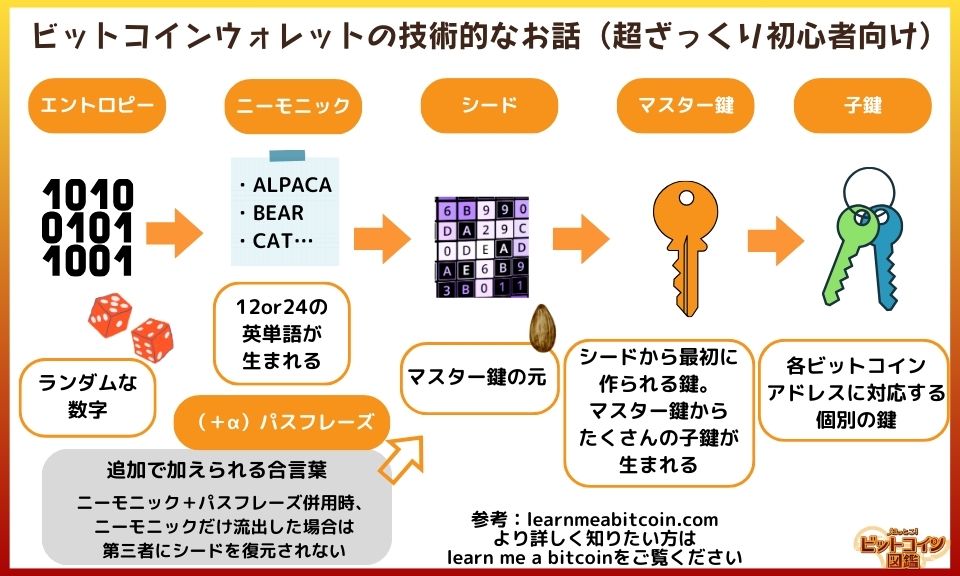
For more detailed learning on the technical aspects of wallets, refer to the following site:
https://learnmeabitcoin.com/technical/keys/hd-wallets/mnemonic-seed/
How to Store Recovery Phrases
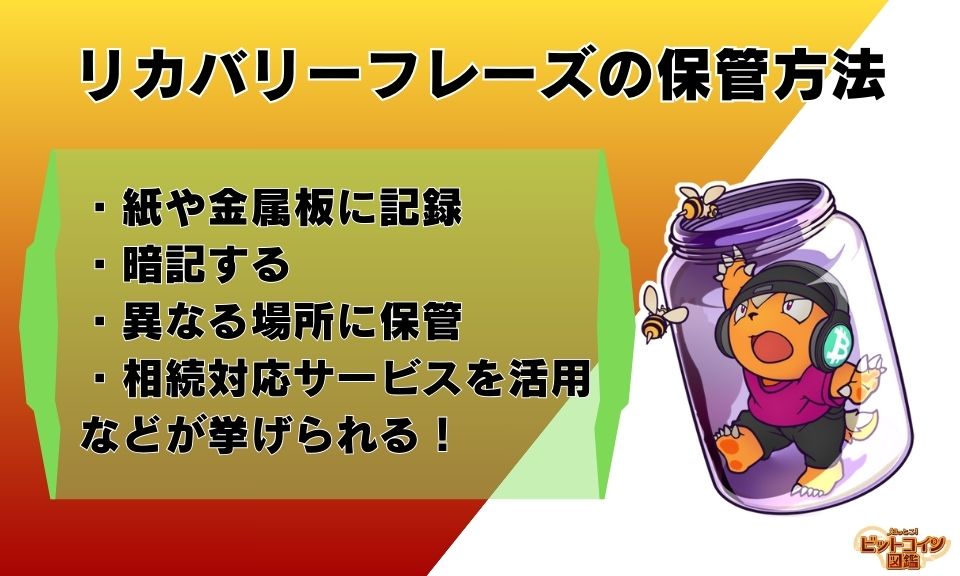
Basic Precautions
Recording and Storing on Paper
The most basic way to store a recovery phrase is to write it down on paper. While this method is easy, paper has low durability and is at risk of being lost to fire or water damage. Using waterproof paper, laminating, or storing in a fireproof safe can enhance security.
Engraving on Metal Plates
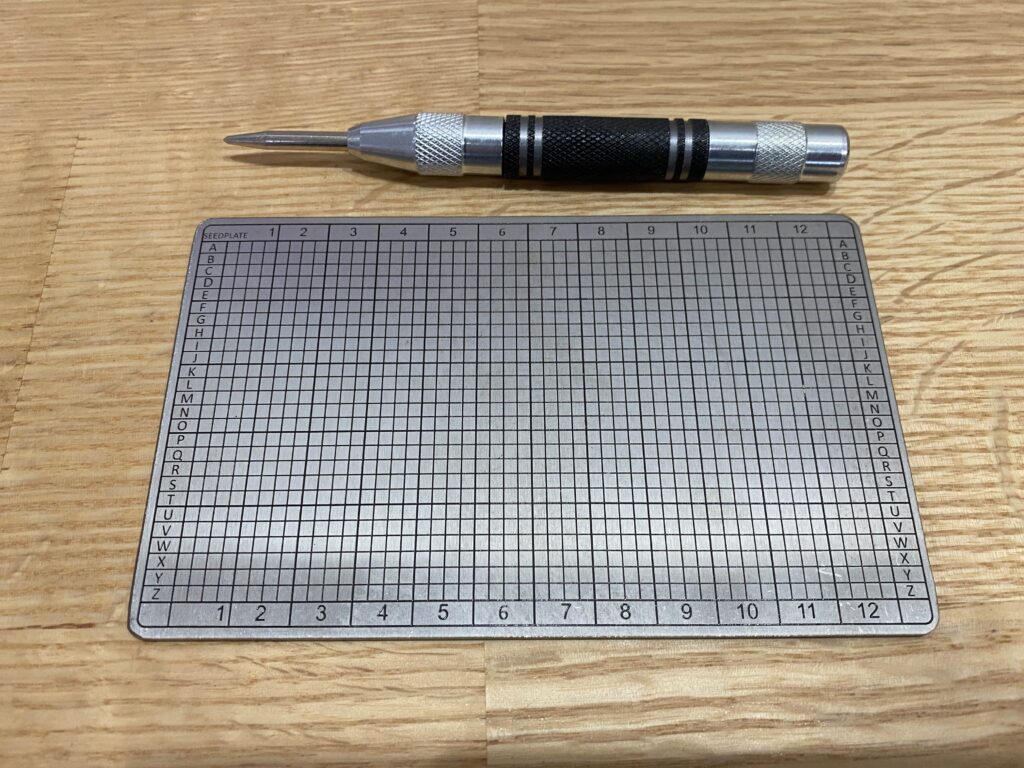
Engraving the recovery phrase on a metal plate can significantly increase durability against physical damage. Metal is resistant to fire, water, corrosion, and aging, making it suitable for long-term storage.
However, metal plates are more expensive than paper, and the engraving process requires special tools and effort.
For more information on metal plates, Jameson Lopp's article on Bitcoin security is very informative.
Reference article:Metal Bitcoin Seed Storage Reviews
Memorizing Your Recovery Phrase
Memorizing your recovery phrase can be as effective as storing it on paper or metal plates. As long as you remember your recovery phrase and passphrase, you can own your Bitcoin anywhere you go.
While recovery phrases can be set to 12 or 24 words, a 12-word recovery phrase combined with a passphrase is sufficiently secure and can be easier to memorize.

Memorize it!? Can I really remember 12 words…?
Many people remember multiple phone numbers of family and friends from childhood. Since recovery phrases are meaningful words rather than random numbers, it's actually easier to memorize with some effort.


How about making a story with the 12 words? For example, if the recovery phrase is "cat apple tree," you could imagine "a cat eating an apple under a tree."
It is also effective to give words a melody. Make sure you remember the word order correctly.


For example, repeating it three times each day before going to bed may be effective.
Even after you memorize it, it's important to review it regularly. For wallets you rarely use, you might forget, so ensure you keep it fresh in your mind for emergencies.

Diversify Storage Locations to Spread Risk
Storing your recovery phrase in different locations other than your home can help diversify risk. Some Bitcoiners store their recovery phrases at a family member’s house or in a bank safety deposit box, while managing the passphrase separately.
To prepare for geographical risks like natural disasters, consider spreading storage locations far apart. For managing large amounts, consider using 2-of-3 multisig setups.

What does distributed storage mean? For example, does it mean dividing 12 English words into three groups and storing them in three locations?
That is one method, but making it too complex can lead to self-GOX (losing your own funds). It's better to adopt methods used by experienced Bitcoiners rather than creating overly complicated personal systems.

Storing Small Amounts in a Wallet Without a Passphrase
For security, consider keeping small amounts of Bitcoin in a wallet without a passphrase. If you're physically threatened, this can serve as a decoy wallet to distract attackers.
If a wealthy person is targeted, they might be asked for access information for all their assets, not just Bitcoin. Avoid actions that could make you a target.

Using Services That Handle Inheritance
Some Bitcoin holders use services that manage their Bitcoin securely while preparing for inheritance. Nunchuk offers a multisig wallet called "Honey Badger" with inheritance planning in mind.
What is Honey Badger?
- 2-of-4 Multisig
Requires 2 out of 4 keys to sign. If one key is stolen, the others can still protect your Bitcoin. - Key Distribution
Secret key 1, secret key 2, a key for the inheritor, and Nunchuk (helps with recovery). - Time-Lock Feature
The inheritance becomes effective on a future date or specific condition set by the user, allowing the user to control the inheritance timing.
Conditions can include "the user hasn’t accessed the wallet for six months," enabling the inheritance process based on user actions (or inaction).
It's a non-custodial system where the user manages the keys, and neither Nunchuk nor any other third party can directly access the Bitcoin.


It's a service that allows users to think about inheritance in the event that they become unconscious or die in an unforeseen accident!
Is There an Optimal Way to Store Recovery Phrases?
It's challenging to determine a single "best" method for storing recovery phrases. Opinions on Bitcoin self-custody vary, and factors like the amount of BTC, residence, family structure, and more need to be considered. It's best to adopt methods that suit your personal situation.
When it comes to Bitcoin self-custody, the information shared by Bitcoin-focused individuals on X (Twitter) can be very helpful.


It's better to learn from those who are genuinely knowledgeable about Bitcoin rather than those who recommend other cryptocurrencies!
セルフカストディ技術も日進月歩なので、色々出てくる中から自分の状況に見合うものを選べばよいかと。保有額、BTC/全資産率、居住環境、生活圏、家族関係、友人関係、余命、性格、リテラシー、スキル、価値観などなど人それぞれなんで。だから自分の方法を人に勧めることはやめた。特にコールドは。
— Teruko (@TerukoNeriki) January 25, 2023
Summary: Manage Your Recovery Phrase Carefully!
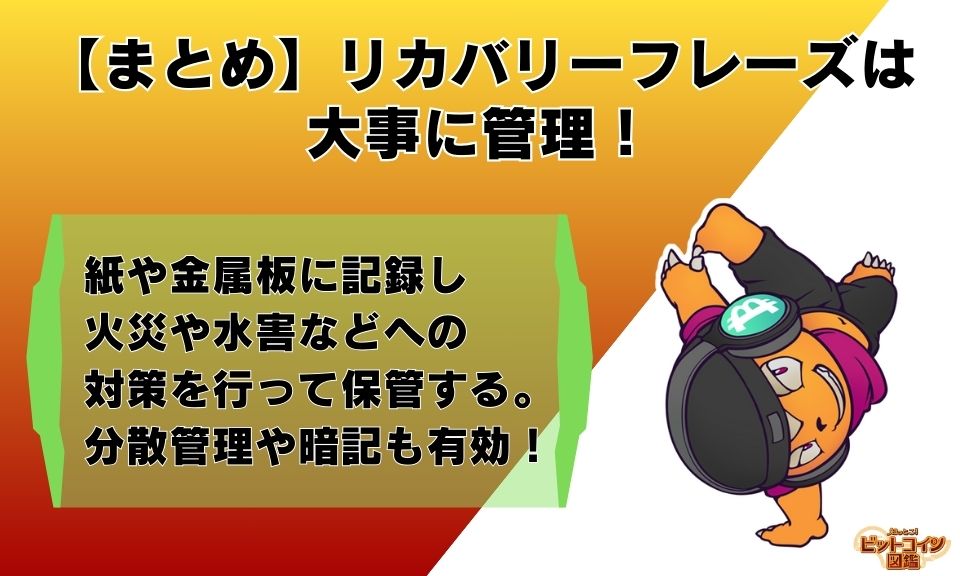
Key Points
- Recovery phrases are randomly generated English words in 12 or 24-word sets. Passphrases are additional words that protect your recovery phrase or wallet.
- Record recovery phrases on paper or metal plates and store them to protect against fires, floods, etc. Consider distributed storage or memorization.
- There is no one-size-fits-all solution for Bitcoin self-custody; it depends on your BTC holdings, situation, and perspective.

It's better to record recovery phrases and passphrases offline on paper or metal plates rather than on smartphones or PCs.
It will be difficult to challenge difficult things all of a sudden, so you should start with storage methods that you can do.


Bitcoin seems complicated and a bit confusing, but I'm interested in learning more about it.
Let's get to know more about Bitcoin!
Recommended Articles:What is Bitcoin?

Writer:Sigeru Minami
Creator of "Bitcoin-zukan.com."
Active as a handmade craftsman of Bitcoin goods.
